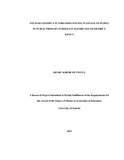| dc.description.abstract | Although the government is providing direct grants to public primary schools through the FPE financing scheme, wastage of education in form of dropout and repetition have continued to be perverse. The purpose of this study was to investigate the socio- economic factors influencing wastage of pupils in public primary schools in Igembe South Division, Meru County. The objectives of the study were to establish the influence of family income, cost of education, family education and early marriage on wastage. The study also sought to establish measures that could be put in place to reduce wastage. The researcher was guided by Theory of Demand all along. The study adopted descriptive survey design to collect the data from all the respondents. Head teachers were purposively sampled while Mulusa’s (1988) table of determining sample size was used to select sample sizes of pupils and teachers. Questionnaires were used to collect data which were analyzed and interpreted using frequencies, percentages and other descriptive statistics. The research established that public primary school perpetually experienced wastage, which lowered the full utilization of the available skilled manpower leaving resources. The family income as evidenced by families low income was unable to purchase education materials and meet the other children’s requirements and the cost of education that was above the reach of the many made the learners to either drop or repeat. The families with low level of family education did not assist their children progress in school, thus lowering the class attendance, early teenage pregnancies, initiations and early age of marriages affected education in form of wastage. Other factors that influenced wastage included students’ individual problems, policies, inadequate financing and unreliable revenue income generating activities. The strategies to mitigate the wastage problems were that parents should be engaged in more economic activities, MoEST and NGOs to stress and sensitize to parents the importance of education to discourage wastage through early marriages and low education levels. The government should increase allocation of funds to FPE to lower education cost to make it more affordable. This will reduce wastage through repetition and drop out. The study suggested that similar study be carried out in other counties for comparison purposes. | en |

